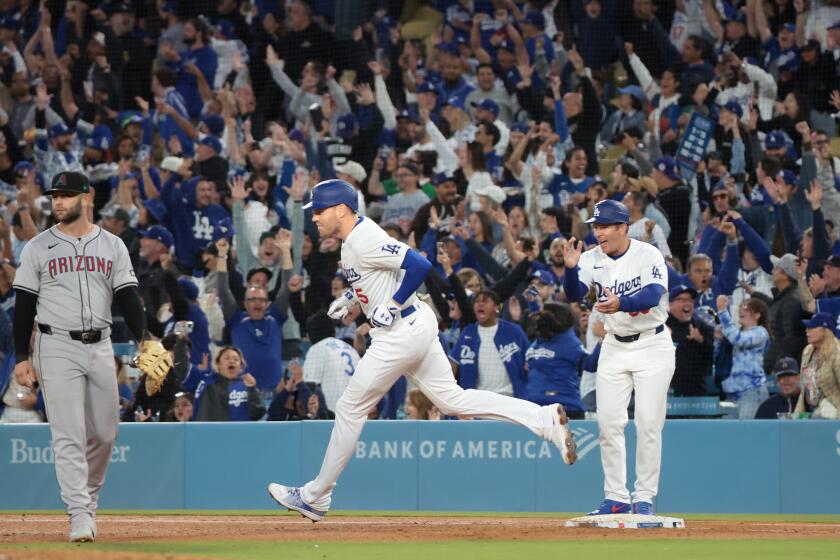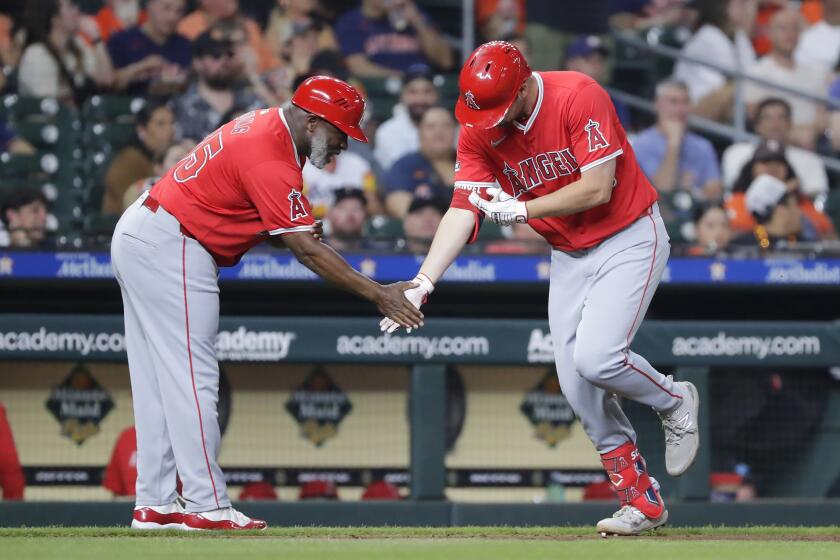The Dreams Are Still Alive in This Boy of Summer
The game is the same. There are 90 feet between bases, 60 1/2 feet between batter and pitcher. Three strikes, you’re out. You have nine men in the field and an umpire and foul lines.
What’s different is a lot of things, the whole emphasis.
The field, for example. It’s not a throw rug, it’s a half-acre of bad hops, holes and unwatered grass. The seats are slivered, the backstop looks like the net stockings on an old dance hall bawd, the lights are insufficient to the purpose, which is to detect when a ball is curving or about to.
It’s the minor leagues, baby. Count the baseballs, turn off the lights when not using, crank up the team bus and don’t let anybody get to the receipts before you do.
These are the real boys of summer. ABC is not interested, the press does not cover road games, Johnny Carson’s show is not on the phone if you go 4 for 4, and you don’t get multimillion deferred contracts. What you get is a couple of hundred a month and a due bill at the local House of Pancakes and a room at the EconoLodge. For two.
Your team isn’t owned by a shipping magnate or a publishing tycoon dabbling in games--it’s run on a shoestring by a guy who eats with his hat on, doesn’t always answer the phone and wishes bats didn’t crack.
Probably the unlikeliest-looking mogul of all time was the man, the president and principal owner, who bought the Utica Blue Sox in the Year of Our Lord 1983.
Roger Kahn is a published author--he wrote the highly acclaimed “Boys of Summer” and half a dozen other best-sellers, and was a sports reporter assigned the glory days of the old Brooklyn Dodgers.
Author Kahn bought into the Blue Sox, to be sure, to get material for a book, but he soon found himself so totally involved that he began to feel more like George Steinbrenner than George Bernard Shaw. The Utica Blue Sox are not to be compared with the great minor league teams of all time, like, say, the 1941 Newark Bears, or any team that Willie Mays played for. But they were as lovable a bunch of American kids as any Bad News Bears or Hollywood fictionalization extant.
They were the most minor of minor league teams when Kahn bought into them, which is to say they were an independent. This means, in fine, that nobody wanted them. Every other franchise in baseball had a major league affiliation.
You see, the idea in minor league baseball is not really to win. It’s just kind of a gigantic outdoor audition. The big leagues are like that animal that eats its young to stay alive itself. It gives new meaning to Grantland Rice’s observation about it not being whether you won or lost, but how you played the game.
The Utica Blue Sox didn’t play the game all that well, but they gave the author an eye-popping insight into the inner workings of the grand old game that few scriveners ever get.
The Blue Sox were kind of floating on the brink of bankruptcy when Roger walked in on them with dreams dancing in his head of being the next Branch Rickey. He learned that he wasn’t buying ballplayers--he had to deal with a flesh-peddling agency in Texas known as the Texas Star Baseball Company for those--he was buying principally debts. “The sale contract was not exactly drawn up by Oliver Wendell Holmes,” his own lawyer ruefully pointed out.
The previous regime had left such things as an electric bill dangling, and the new owner had to pony up $4,500 at once or his team would be playing in the dark--which, as it happens, might not have affected their style of play appreciably.
Utica itself was not exactly Boomtown, USA. Like a lot of Northeastern industrial centers, its population had shrunk by 25% in recent years, owing largely to sun-belt exodus. About 200 miles northwest of New York City, it was, Kahn notes lugubriously, metaphorically “about as far from Manhattan as Tobacco Road.”
The team was about that far from Yankee Stadium, too. A collection of short-order cooks, used-car salesmen and some college kids, it included one player who talked to nobody but himself, which he did constantly, an outfield that averaged 5 feet 5 inches in height and a player whose alimony payments exceeded his monthly salary by 300%.
The manager was a combination Capt. Bligh and John Wayne, the team was more mutinous than ambitious, and the pitchers sometimes seemed to have three pitches--fastball, slider and home run. One starter had an earned-run average of 9.17.
The best pitcher on the team--maybe in the New York-Penn League--came in one night to explain to Kahn that he was going over the wall. His wife’s friends “ask her what she’s doing married to a man who leaves a good job in the summer to go play a kids’ game in a town they don’t know for a team they never heard of for $500 a month,” he explained.
Owner Kahn had no answer.
Branch Rickey might have talked the star into staying--probably for less money--but Kahn realized that he was not front-office material himself when he found himself saying: “I can’t tell you to stay and lose your marriage. I can’t say that.”
Kahn tells the story of his bittersweet summer in a delightful little book called “Good Enough To Dream,” which is decidedly good enough to read. Published by Doubleday, it’s what America is all about, as timeless a sweep through the dreams and fears that make us what we are as you will find in any literature. This, you feel, is baseball, not that puffed-up commercial spectacle they call the World Series.
More to Read
Get our high school sports newsletter
Prep Rally is devoted to the SoCal high school sports experience, bringing you scores, stories and a behind-the-scenes look at what makes prep sports so popular.
You may occasionally receive promotional content from the Los Angeles Times.






